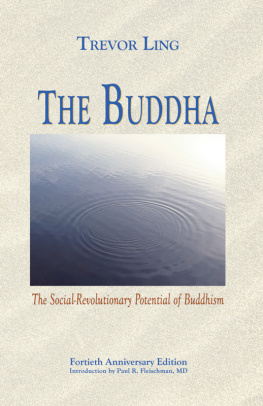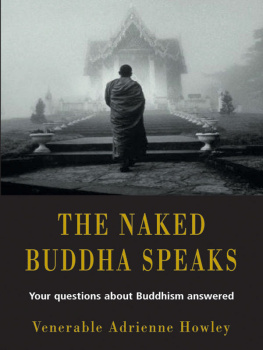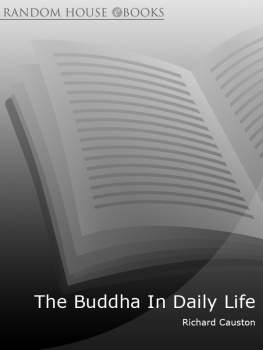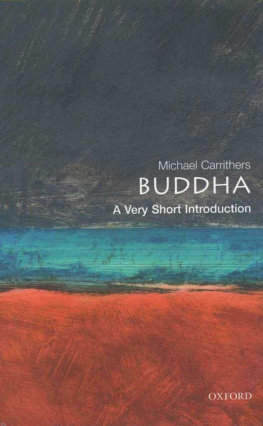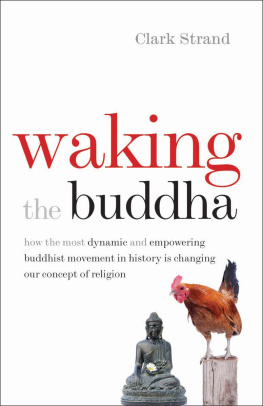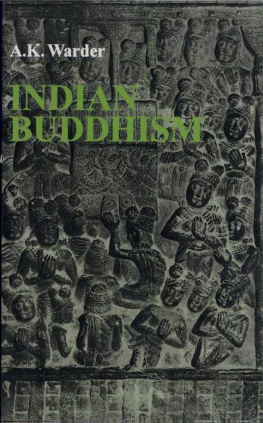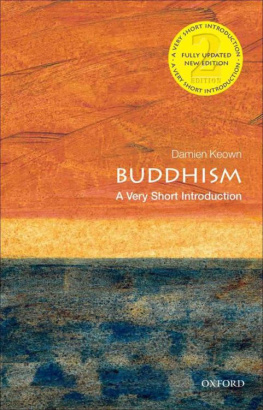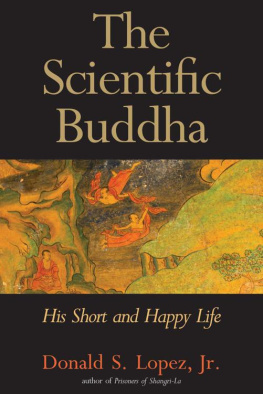The scanning, uploading, and distribution of this book via the Internet or by any other means without the permission of the publisher violates the copyright.
You support Pariyatti in its mission by honoring the copyright and by not sharing this e-book broadly with others who might otherwise purchase it. By encouraging others to purchase e-books, you will be helping Pariyatti to continue to bring future books such as this one to a broader audience.
Please purchase only authorized electronic editions and do not participate in or encourage electronic piracy of copyrighted materials. Thank you for your support.
The Buddha
The Social-Revolutionary Potential of Buddhism

Trevor Ling
THE BUDDHA
The Social-Revolutionary Potential of Buddhism

Onalaska, WA, USA
The transliteration of the Devangari (Indian) script on the titlepage is as follows:
namo tassa bhagavato
arahato sammasambuddhassa
These words, which are in Pli, the language of Theravada Buddhism, may be translated as follows:
Honour to Him, the Blessed One,
the Worthy One, the fully Enlightened.
Gotama, the Buddha, is frequently referred to in the Buddhist texts as Bhagava, or the Blessed One. This sentence is customarily said three times before any Buddhist devotions, as a mark of respect, and in praise of the Buddha.
Pariyatti Press
an imprint of
Pariyatti Publishing
867 Larmon Road, Onalaska, WA, USA
www.pariyatti.org
1973 Trevor Ling, 2013 Estate of Trevor Ling
Introduction 2013 Paul R. Fleischman
First edition, 1973 published by Charles Scribners Sons (New York) under the title: The Buddha: Buddhist Civilization in India and Ceylon.
Second edition, 2013
ISBN: 978-1-938754-32-6 (Print)
ISBN: 978-1-938754-29-6 (ePub)
ISBN: 978-1-938754-30-2 (Mobi)
ISBN: 978-1-938754-31-9 (PDF eBook)
Library of Congress Control Number: 2013931531
All rights reserved. No part of this book may be used or reproduced in any manner whatsoever without the written permission of the publisher, except in the case of brief quotations embodied in critical articles and reviews.
We have made every effort to contact the original copyright holders of certain works, but in some instances this has not been possible. Please contact Pariyatti if you feel your copyright has been infringed.

Pariyatti enriches the world by disseminating the words of the Buddha, providing sustenance for the seekers journey and illuminating the meditators path.
From the first edition (1973)
Dedicated with her permission to
SHRIMATI INDIRA GANDHI
Prime Minister of India
in the 25th Anniversary Year
of the Republic of India
Contents
Editors Note
by Professor S. C. F. Brandon
No founder of a great religion ever lived before his time. To win disciples, his message had to be relevant to current needs and presented in a contemporary idiom. Hence such a message drew upon a tradition of culture, and it cannot be truly understood apart from it. But it contained also something new, some fresh and dynamic insight into the nature and destiny of man that derived from a unique religious sensitivity, and was embodied in the personal being of the genius concerned. It is because of such factors that the emergence of a new religion marks the beginning of a process of change destined to affect the lives of untold generations of individuals and have incalculable cultural, and often political and economic, consequences. To that process of transformation many others in time contribute, possibly altering in varying degrees the founders message or deflecting the development of his intention. Thus from the alchemy of the founders own genius, which transmutes the cultural tradition in which he was nurtured, there gradually evolves a new culture and civilization. And so, to take a random example, a causal nexus of infinite complexity connects Jesus of Nazareth, a Galilean Jew of the first century, with the building of the Cathedral of Chartres, that supreme epitome of Western medieval culture.
It is the aim of this series of books to show something of the fascinating transformation of cultural traditions that the founders of the great religions have wrought in the course of history. Starting with the world into which such a founder was born, each volume will attempt to explain how, from the stimulus of his personality and teaching, a new cultural world eventually emerged.
Introduction
by Paul R. Fleischman, MD
The Buddha, by Trevor Ling, has become more important today, in the 21st Century, than it was in 1973 when it originally appeared. This growth in value over time is the hallmark of an excellent book, but it is also due to the rebirth of the Buddhas teaching. When Professor Ling wrote The Buddha there were few English language readers who were trying to walk the Buddhas path, but today tens of millions of English readers in both Western and Eastern countries are deep students and practitioners of it and Dr. Lings book now provides a potentially large readership with a relatively short, lively, non-pedantic but scholarly study of the environmental, social and historical context of the Buddhas teaching.
Professor Ling addressed the Buddhas legacy from a particular standpoint, asking us to consider whether it provides a model with which we can build a better world today. Dr. Ling thrust the Buddha into our contemporary situation in a manner that demanded active consideration. Because of this particular angle, I have read, reread, underlined and treasured my out-of-print copy of the 1973 hardcover edition. For people who are casting about in the tides of history to find elevating and directive models for society, Trevor Lings understated passion for the Buddhas example will be riveting. But he didnt merely elevate the Buddhas message. He compelled us to examine its context, goals, problems, and potentials.
This book was written with the intention that its readers be shaken into awareness of, the social-revolutionary potential of Buddhism
II
Trevor Oswald Ling was born in 1920 into a religious English family. The Second World War drew him to India, where despite his plans to become a Baptist clergyman, he became a student of Sanskrit, Pli and classical Indian literature. After the war, he completed a degree at Oxford, taught college and was a parish minister, and, in 1960, obtained a doctorate from the School of Oriental and African studies. His dissertation compared the concept of evil in Buddhism and Christianity, and led to his first book. His distinguished academic career evolved into a uniquely free-spirited pursuit of authenticity, that led him to leave Baptism for Anglicanism, and then to resign his Anglican priesthood, while he published numerous books, held academic posts in both England and Asia, and eventually declared himself to be (according to his wife, Dr. Jeanne Openshaw) a Buddhistic sort of person and finally, a human being. Among other positions, he held a Personal Chair in Comparative Religion at the University of Leeds and was Chair of Comparative Religion at Manchester University. He was also a visiting professor at Shantiniketan, the university founded by Indias Nobel Prize winning poet, Rabindranath Tagore, and later a Senior Research Fellow in Singapore.
Lings numerous books were wide ranging, but at the center was usually original Buddhism.
Next page
